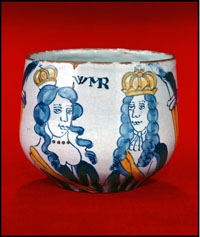The Bill of Rights

The Convention Parliament passed the Bill of Rights, officially called "An Act Declaring the Rights and Liberties of the Subject and Settling the Succession of the Crown," in December 1689. This legislation essentially turned into law the Declaration of Rights, which had been presented to William and Mary in February and read aloud before their joint coronation on April 11. It was profoundly significant for the future of the British monarchy because it fundamentally acknowledged that all constitutional authority was derived from the people through their representatives in Parliament.
The bill outlined the constitutional abuses of James II and explained how he had vacated and thereby abdicated the throne. Furthermore, his abdication required that the crown pass to those next in line for the succession: his Protestant daughters, Mary and Anne, and his nephew, William. The Protestant succession would be further clarified by the Act of Settlement of 1701. It also guaranteed a number of foundational constitutional rights to the English people, including a ban on standing armies without the consent of Parliament, a prohibition on the suspension or the dispensing of laws by the monarch, no taxation without the consent of Parliament, no special courts or tribunals, the guarantee of the freedom of subjects to petition the crown for redress of grievances, free elections, and frequent parliaments.
By the 1730s it would be hallowed, along with Magna Charta and the Petition of Right, as a foundation of the British Constitution and the core result of England's Glorious Revolution.












